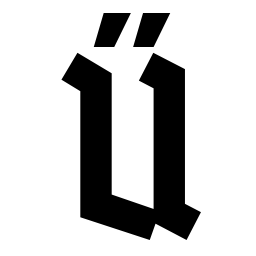Function pointers¶
There is a possibility in Ü to save a function address into a pointer and than call this function with it.
Function pointer is a separate type kind.
Its name is started with fn keyword, than follow parameters description, (optional) reference pollution, (optional) unsafe modifier, return value description.
type simple_fn = fn();
type int_ret_fn = fn() : i32;
type f_arg_fn = fn(f32 x) : f32;
type ref_ret_fn = fn(i32 &x) : i32&;
type binary_fn = fn(i64 x, i64 y) : i64;
type unsafe_fn = fn(u32 x) unsafe : bool;
It’s necessary to initialize function pointer.
It’s possible to initialize it with zero_init, but program execution will be terminated in case if such zero function pointer is called.
Usually a function pointer is initialized with a function.
fn Bar();
fn Foo()
{
var (fn()) fn_ptr = Bar;
fn_ptr(); // "Bar" function will be called
}
When multiple functions with the same name exist, the function with matching type will be chosen.
fn Bar(i32 x) : i32;
fn Bar(f32 x) : f32;
fn Foo()
{
var ( fn(f32 x) : f32 ) fn_ptr = Bar; // "Bar(f32 x) : f32" function will be chosen
var f32 res= fn_ptr(0.0f);
}
It’s possible to initialize a function pointer with another function pointer.
fn Bar0();
fn Bar1();
fn Bar2();
type fn_ptr_type= fn();
fn Foo()
{
var fn_ptr_type mut fn_ptr= zero_init;
fn_ptr = fn_ptr_type(Bar0);
fn_ptr(); // "Bar0" function will be called
fn_ptr = fn_ptr_type(Bar1);
fn_ptr(); // "Bar1" function will be called
}
There is a possibility to perform implicit conversion from a function into a pointer, but only if there is only one function with such name.
fn Bar();
fn Baz( ( fn() ) ptr );
fn Foo()
{
var ( fn() ) mut ptr= zero_init;
ptr= Bar; // Implicitly convert "Bar" into a pointer in assignment.
Baz( Bar ); // Implicitly convert "Bar" into a pointer in function argument passing.
}
Function pointer conversions¶
It’s allowed to initialize a function pointer with a value of different function pointer type. But the type of this function pointer must be compatible.
Compatibility rules are following:
Return types must be equal
Return reference modifiers must be the same
It’s allowed to convert a function pointer returning
mutreference to a function pointer returningimutreference. Backward conversion isn’t allowed.The number of parameters must be the same
All parameter types must be the same
Reference modifiers of parameters must be the same
It’s allowed to convert a function pointer with
imutreference parameter to a function pointer withmutreference parameter. Backward conversion is not allowed.Conversion is possible while converting a pointer returning less logical references to function pointer returning more logical references
Conversion is possible while converting a pointer performing less reference pollution to function pointer performing more reference pollution
It’s possible to convert pointer to safe function into pointer to
unsafefunction.
fn IMutArgFn( i32 &imut x );
var ( fn( i32 &mut x ) ) mut_arg_fn_ptr = IMutArgFn; // Convert parameter mutability
fn MutRetFn( f32 &mut x ) : f32 &mut;
var ( fn( f32 &mut x ) : f32 &imut ) imut_ret_fn_ptr = MutRetFn; // Convert return reference mutability
fn SafeFn();
var ( fn() unsafe ) unsafe_fn_ptr = SafeFn; // Convert unsafe modifier
var [ [ char8, 2 ], 1 ] return_references_first[ "0_" ];
fn FirstRetFn( i32& x, i32& y ) : i32 & @(return_references_first);
var [ [ char8, 2 ], 2 ] return_references_first_and_second[ "0_", "1_" ];
var ( fn( i32& x, i32& y ) : i32 & @(return_references_first_and_second ) ) all_ret_fn_ptr = FirstRetFn; // Convert with different return references
During function pointer initialization the compiler ensures that this conversion is possible. If multiple conversions are possible an error will be generated.
fn Foo( i32 &imut x, i32 &mut y );
fn Foo( i32 &mut x, i32 &imut y );
var ( fn( i32 &mut x, i32 &mut y ) ) foo_ptr = Foo; // Error: can't select matching function - too many candidates
Function pointers comparison¶
There are equality compare operators for function pointers. But they are a little bit tricky. All function pointers obtained from the same function pointer will be the same. Function pointers may be or may not be equal if they point to the same function in different places of the program. Function pointers may be or may not be equal if they point to different functions.
fn Bar0(){}
fn Bar1(){}
fn Foo()
{
var (fn()) ptr0= Bar0;
var (fn()) ptr1 = ptr0;
var (fn()) ptr2= Bar0;
var (fn()) ptr3= Bar1;
auto cmp0 = ptr0 == ptr1; // Result is true
auto cmp1 = ptr0 != ptr1; // Result is false
auto cmp2 = ptr0 == ptr2; // May be true or false
auto cmp3 = ptr3 == ptr0; // May be true or false
}
